Helpless and horrified: An oral history of 5 Jews in America on Oct. 7, 2023
How a rabbi, an actress, a student and others heard about the Hamas attack and what they did next
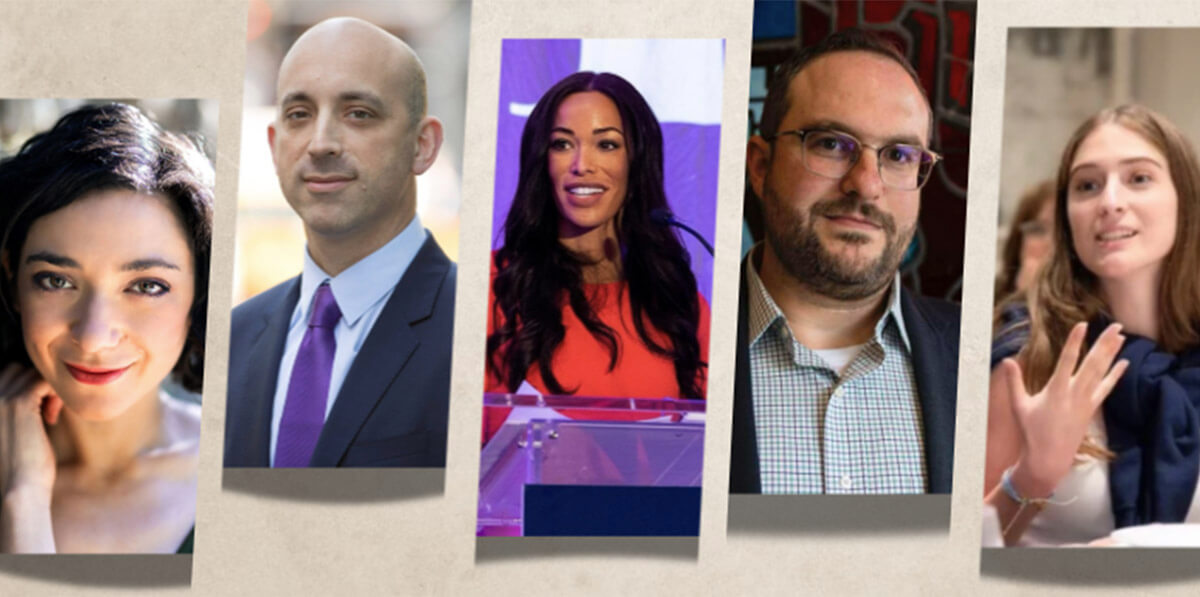
Left to right: Julie Benko, Jonathan Greenblatt, Tiffany Harris, Rabbi Dovid Asher and Chloe Katz.
The iPhone buzzed on the nightstand, waking up Jonathan Greenblatt, the CEO of the Anti-Defamation League. It was 3 a.m. in New York City on Oct. 7.
“My wife and I were in bed,” Greenblatt recalled. “It was the head of my Jerusalem office. She said, ‘Jonathan, I’m in my safe room with my family. There are missiles falling all over the country.’”
It was the first flicker of the unfathomable: a terror attack in which Hamas killed some 1,200 people in Israel and kidnapped another 240.
For American Jews thousands of miles from the disaster, the experience of what became known as the deadliest day for Jews since the Holocaust was at once communal and individual. Most of us were tethered to our phones, to our TVs, to our computer screens — hungry for news and connection, fearful of what we might see next. The fact that it was Simchat Torah, one of the most joyful holidays on the Jewish calendar, only made it more surreal for those who celebrate.
At the Forward, normally quiet on Shabbat and holidays, our journalists did what journalists do: asked tough questions, shared emotional stories, analyzed developments, reflected their experience.
As we approached the one-year anniversary, I found myself wondering about how other American Jews experienced those first hours. Prominent leaders like Greenblatt and Jewish celebrities, but also anonymous rabbis and college students who, in their own ways, would spend the year on the front lines. I interviewed widely and ended up with five individuals whose stories offer a glimpse at the great range of emotions, ideas and activities that consumed Jews in the U.S.
Greenblatt spent the day fielding phone calls from politicians and leaders of other Jewish groups worried about potential attacks in the U.S. Rabbi Dovid Asher and his Orthodox congregation in Richmond, Virginia, huddled around the security guard in their synagogue parking lot for the latest updates. Chloe Katz, then a junior at Columbia University, was on campus for services and tried to balance the festival and the fast-breaking news.
Tiffany Harris, who runs programming for the nonprofit Moishe House, spent the day checking in on employees and participants in Israel as she cleaned her D.C. apartment ahead of a visit from her in-laws. Julie Benko, a Broadway actress starring in a show about the Holocaust, did not hear the news until leaving rehearsal in the early afternoon, then spent the weekend alone and glued to her phone.
Here is how each of these five recalled Oct. 7 in recent interviews, edited for clarity and length.
‘Like a bolt of lightning’: Jonathan Greenblatt
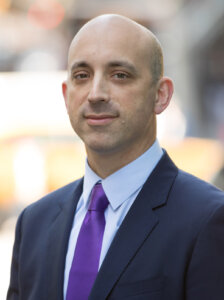
Greenblatt, 53, has been head of the ADL since 2015. He lives in New York City and was planning to fly to Israel the night of Oct. 7 with his wife and son, who was headed there to study abroad.
At the ADL, we don’t work on Saturdays. We have a very strict rule, no email, no phone calls, no text messages, no Slack messages, nothing on Shabbat, because it’s Shabbat, and a lot of us go to synagogue.
But as often is the case, Charlottesville happened on a Friday night, Pittsburgh was on a Saturday, Poway was on a Saturday, Colleyville was on a Saturday.
I spent the day on the phone with my staff, members of Congress, and Jewish communal leaders. I have a lot of family over there, and I was trying to make sense of what was going on. We really didn’t understand what was happening. It was really like a fog-of-war kind of thing.
The ADL has 25 field offices and 500 full-time employees. We have a battle rhythm when there’s an emergency, and we know how to triage and how to respond, and how to give information, collect intelligence, all these things.
So everybody came in, and we were seeing stuff popping by the afternoon on social media. It was quite dizzying. We started getting calls from all over about antisemitic incidents. It was like a bolt of lightning.
I’ve had tough days, but Oct. 7 was the toughest. There was so much uncertainty and there was so much pain, and we didn’t even know the half of it. I think people don’t realize just what a wrenching, horrific, traumatic day that was for everyone in the Jewish world.
‘I felt very helpless’: Rabbi Dovid Asher
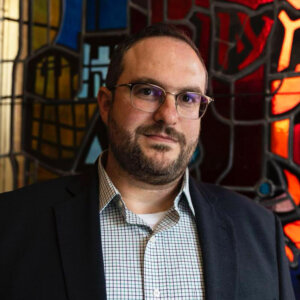
Asher, 41, has led Keneseth Beth Israel, a shul of 160 members, since 2011. He is the father of four children.
I’m walking to shul in the morning and as I’m approaching the main entrance, the off-duty cop who patrols our parking lot seemed really bothered and disturbed. He said something about a terrorist attack in Israel.
We know this is part of our history. But this policeman who protects us every week, he doesn’t know about catastrophic and violent and murderous antisemitism. He’s bewildered beside himself.
So, I could tell something was up, but I didn’t want to scratch it. I didn’t want to know. It was yontif. I didn’t want to be sad.
During services, there were more murmurings. Congregants started coming up to me on the bimah with more details. Somebody said it was 40 people who died, and then somebody said 200, 400. My mind couldn’t process. I didn’t want to believe it.
At the end of davening, the shul president really let loose and said, “This is going to be one of the darkest, bloodiest days.” And I thought it was a little over-the-top, and I didn’t want to send that message at that moment. In retrospect, it was totally fine.
Congregants needed me, but I’m two people, right? I’m a feeling, individual Jewish person, and I’m a communal leader. So those two identities have to coexist. I couldn’t do anything until after yontif anyway. So I’m trying to be normal for the sake of my kids, for the sake of myself.
The big thing, of course, was Simchat Torah that night. Are we going to dance? I think you have that tension of, “Let’s dance harder, let’s lean in more.” But also your body doesn’t totally feel it. You’re not into it, and it’s a struggle. So you have that tension, again, on a personal and a kind of communal level. I felt very helpless.
I have this question in my head: Will Simchat Torah ever be the same again? Are we going to be able to celebrate it without thinking of Oct. 7 ever again? For how long? 50 years? 100 years? How long is it going to take?
‘One of the greatest fears’: Julie Benko

Benko, 35, who starred as Fanny Brice in the Broadway musical Funny Girl, was in rehearsals for Harmony, a show produced by Barry Manilow about Jewish performers in Weimar-era Germany that began previews on Oct. 18, 2023.
I was leaving the rehearsal space feeling good. And then I started getting alerts on my phone that something’s going on in Israel.
My husband was away doing a musical performance out of town. And so I went home and then I was just glued to my phone, watching everything come in by myself for basically the whole weekend. We’re millennials, so we don’t have cable, but I was on The New York Times site and really getting a lot from Instagram.
It was very hard to be alone and to have him not be there, because those images of the women being paraded through the streets — it was just the stuff of total nightmares. And so you’re just watching it on loop over and over by yourself.
I read what happened at the Nova music festival. It’s one of the greatest fears, and it’s one thing that you have to do when you start any new Broadway show: They walk you through what to do if there’s a fire. Here’s where you go if you’re in this dressing room; this is how you go out if you’re on stage. But now it’s also if there’s an active shooter, or if there’s a bomb threat.
After Funny Girl ended, I had some different options about what I wanted to do as my next job. And I specifically chose Harmony, because the way antisemitism is rising these days, it feels really prescient.
I had chosen it for that reason, but then I couldn’t have known that that reason would become 100 times more potent while I was doing it, and it did give me a sense of purpose, to go to the theater and feel like there is a real reason that we need to tell the story. And I felt very grateful to be the one to get to do it.
‘My soul and my heart had been pierced’: Tiffany Harris
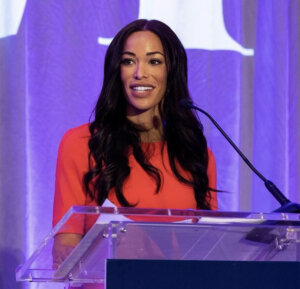
Harris, 38, is the chief program officer at Moishe House, which helps young adults build Jewish communities through peer-led programs. She has a master’s degree in political science from Tel Aviv University and currently lives in Zurich with her fiancée. They lived in Washington, D.C., on Oct. 7.
I woke up that morning, and, like a lot of people, the first thing I did was check my phone, and I saw all of the rocket alerts. I started seeing the videos and it was so unbelievable. I saw the Hamas paraglider coming into Israel. You just never picture something like that.
This yoga teacher who I’ve been going to for the last 11 years posted on social media, “This is what you get like when you oppress an entire nation.” I started seeing a lot of messages justifying the attack.
I knew I needed to check on staff and check on our community builders and talk to our colleagues in Israel. I also had staff that didn’t live in Israel who were on the ground in Israel during that time for another program.
We didn’t get confirmation that day that everybody was OK yet. Obviously, because people were rushing in and out of bomb shelters. We spent the day extremely, extremely worried.
I sit on a council — it’s like the Jewish leaders’ kitchen cabinet for the White House Jewish liaison. So friends of mine know that I have a very loose connection to the White House. And so then I started getting messages like, “Please help us, please tell the president this.” I felt an immense amount of sadness and, of course, I passed all the messages on to the Jewish liaison. I’m sure she was getting flooded that day.
My fiance is not Jewish. He grew up in Amsterdam. His parents were coming to stay with us in our small apartment in D.C. for two weeks. I was explaining that I don’t think I’m going to be able to go out to dinner with you. I just needed to grieve. And I’m really freaking out.
And I realized, like, for them, Israel might as well be Libya, Afghanistan or something like that. They’re just like, ‘Oh, more chaos in the Middle East.’ It made me realize that the rest of the world is just not experiencing what we’re experiencing right now.
I was in my room a lot and crying. My soul and my heart had been pierced in a way that I didn’t even know was possible. I knew I loved Israel. I cared about Israel. I felt connected. I didn’t know how connected I felt until that moment.
‘Today is now a fast day’: Chloe Katz
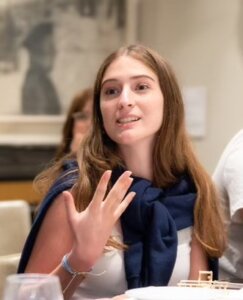
Katz, 21, is a senior at Columbia University, majoring in psychology. She’s part of a program where students spend their first two years at Tel Aviv University and then transfer to Columbia for the final two years. Katz arrived on the Manhattan campus about a month prior to Oct. 7. She and a friend who was visiting were at Yavneh, which is the Modern Orthodox group at Hillel.
Around Torah reading time, the rabbi got up to speak in front of everybody, and I just assumed it was going to be his regular sermon. And instead he said, “I’m really sorry to tell you guys this, but in the last few hours, Israel’s gone to war.”
Israel is always in some kind of war. It can’t be anything different. But they told us Hamas attacked kibbutzim, burned down houses and killed many, many people. That’s when it started to sink in for me. I just started sobbing.
It felt like my home, my culture, my community, my friends and people that I love were under attack. In my head, everybody I knew was under attack.
There’s a law on the holiday — v’samachtah b’chagechah — that you’re supposed to be happy.I was not aware of that, and so when I heard the news, I didn’t think in my head, “Oh, I have to be happy, I have to even be happy right now.” My thought in my head was just: “Israel’s under attack. I’m devastated. I’m shocked. I’m, you know, not happy.”
But the friend who I was with over the holiday, this is a very important law for her, and so we actually had an interesting dynamic, me and her.
My first thought was: Today is now a fast day. I really felt bad because I don’t know what’s right in this situation. Is it selfish of me to let myself mourn and not to be a good hostess for my friend? It was hard not knowing if I’m allowed to grieve loudly.
For Simchat Torah that night, my friend and I first went to Chabad. Chabad is usually super happy on the holidays. There’s really this spirituality and Jewish joy. But it was absolutely not like that.
And then, because I knew my friend wanted to be happy on the holiday, I knew that Hillel also had their own hakafot, so then me and her left to go there. People were dancing, people were singing very loudly. It was tough for me. That really wasn’t the mood I was in.
And then they danced down the street to do more hakafot on the plaza on Columbia’s campus. Eventually, we went into a big circle and were singing Jewish songs — like “Acheinu” and “Hatikvah” — and people were just crying and so sad. We had Israeli flags and people were holding the Torahs. The awareness of the day was very, very, very present, and I think we were just trying to mourn.

















